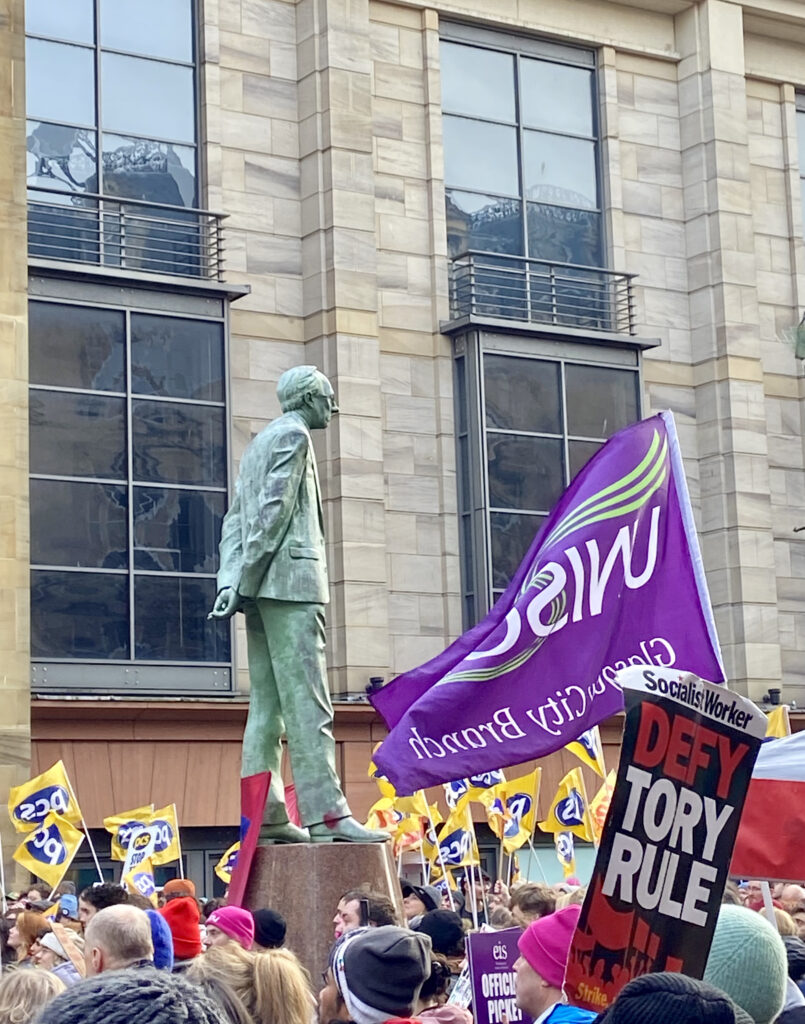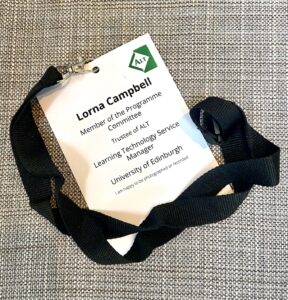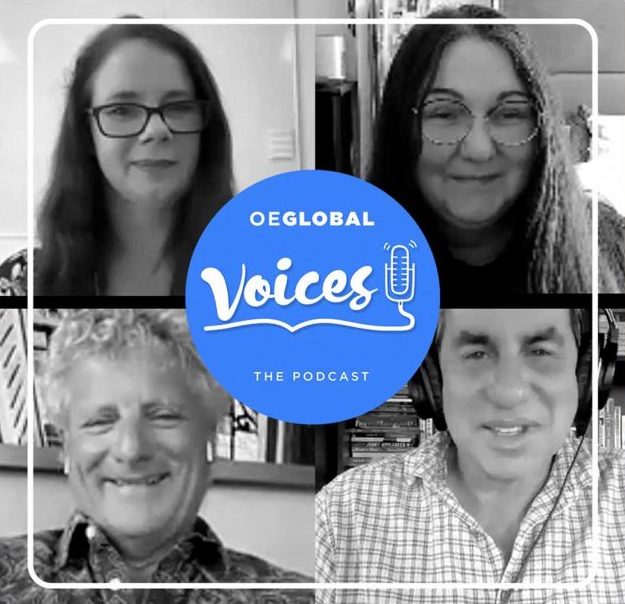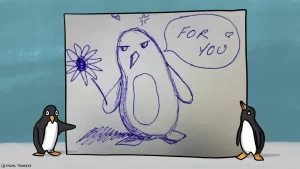Is February too late (or early??) to write an end of year round up post? People often complain about January dragging but I swear it passed in the blink of an eye this year, and somehow we’re already half way through February. This is way, way, after the fact, but there are a few things I did at the end of last year that I don’t want to get lost in the churn.
Although I didn’t manage to write an end of year review for this blog, I did write one for Open.Ed, the University of Edinburgh’s OER Service, which you can read it here if you’re interested: OER Service 2022 Roundup.
EDEN NAP Webinar
In early December I was invited to take part in an EDEN NAP webinar on Institutional Approaches to Supporting Open Educational Resources, which explored the different ways that Universities are building open education capacity and acting as enablers of innovative open practice. I spoke about our experience of embedding strategic support for open education and OER at the University of Edinburgh. The other speakers were Professor Daniel Burgos, Universidad Internacional de La Rioja (UNIR), Dr Carina Ginty, Atlantic Technological University, and Fiona Schmidbauer, DHBW Karlsruhe. There was an impressive turnout of over 160 participants from all over Europe. The webinar was recorded and I’ll link to it here once it’s online.
ENCORE+ Webinar
I also took part in another webinar on OER and credentialing, run by the European Network for Catalysing Open Resources for Education (ENCORE+) Project. ENCORE+ is an ERASMUS+ Knowledge Alliance project, funded by the European Commission, which supports the uptake and innovation of open educational resources for education and business. Earlier in the year I was interviewed by Dai Griffiths as part of a series of interviews exploring innovative approaches to credentialing learning in the European OER ecosystem, the opportunities that they offer, and the barriers to their application. During the interview we discussed strategic support for OER at the University of Edinburgh, the role (or not) of OER repositories, and benefits for students creating open education resources and open knowledge as part of their accredited courses. The webinar brought together several of the interviewees to discuss some of the themes that had emerged in the interviews in more depth. You can read my interview here: ENCORE+ Interview.
Femedtech
At the beginning of December I took over from Maren Deepwell as administrator of the femedtech Twitter account. Maren has managed the account and our guest curators for the last year and I’m hugely grateful for the simple and efficient process she handed over to me. Clearly we need to question the ongoing viability of Twitter as a platform for femedtech given the (lack of) ethics of its current proprietor and the degradation of the platform itself. Femedtech has always been a loose collective with multiple channels and I know that some of our curators this year will be exploring how we can use those other channels, including femedtech.net, and potentially Mastodon, going forwards. In the meantime, we’re going to continue curating the femedtech account and hashtag on Twitter, so if you’d like to put your name down for a curation slot you can volunteer here: Get involved with femedtech.
I also did my own curation slot during December, the first time I’d curated for a couple of years. (You can read my reflection on my last curation slot here: Reflections on @Femedtech Curation.) I had planned to open a discussion about the ethics of remaining on twitter, and the logistics of moving to another platform such as Mastodon, but I got sidetracked by the ongoing debate about the ethics of AI art algorithms, their use of art works scraped from the commons, and the harmful stereotypes that appear to be inherent in the datasets and algorithm themselves.
Critical Ignoring
I think the real highlight of my curation slot was coming across this paper by Anastasia Kozyreva, Sam Wineburg, Stephan Lewandowsky, and Ralph Hertwig on Critical Ignoring as a Core Competence for Digital Citizens.
Low-quality and misleading information online can hijack people’s attention, often by evoking curiosity, outrage, or anger. Resisting certain types of information and actors online requires people to adopt new mental habits that help them avoid being tempted by attention-grabbing and potentially harmful content. We argue that digital information literacy must include the competence of critical ignoring—choosing what to ignore and where to invest one’s limited attentional capacities.
Critical ignoring is not a concept I’ve come across before but it’s something I’ve been consciously practising for the last couple of years. If you spend any amount of time online it’s really hard not to get sucked into spirals of negativity, outrage and despair, especially when social media algorithms actively promote “controversial” content and push it into our feeds. Some people I know have sworn off social media altogether or take regular breaks to decompress. I make frequent use of block and mute functions, and I also try to make a conscious decision as to whether it’s worth expending valuable emotional energy engaging with posts that will only anger or upset me. I’ve also made more of an effort to separate my “work” and “non-work” time online. It’s not always easy to know where the boundary lies but on days that I’m “not working” I log out of my main twitter account and ignore any e-mail sent to my work address. This does mean that I sometimes miss personal messages sent through these channels, but I’m trying not to feel too guilty about that. Sometimes it works, sometimes it doesn’t. The irony in all this is that I haven’t actually read beyond the first page of the Critical Ignoring paper…
UCU Industrial Action
I can’t finish this post without mentioning the latest round of UCU industrial action, which will see university staff striking for 18 days throughout February and March in protest at pay erosion and inequality, precarity, unsustainable workloads and pension theft. The first quarter of the year is always a really busy time for me because several open education events, including Open Education Week and preparation for the OER Conference fall in this period, so I find it really stressful not being able to work. It’s going to be a long couple of months and the financial impact is going to be painful, but the alternative, just buckling down and doing our best in a system that is increasingly inequitable and exploitative is no longer sustainable.

Right to Strike rally, Glasgow, February, 2023. CC BY, Lorna M. Campbell

 I’ve already written a post about the joy of reconnecting with colleagues at the ALT Conference last month, but the conference also marked a significant end point for me. During the AGM, I formally stepped down from the Board of ALT, after my second term as a Trustee came to an end after six inspiring years. Earlier this summer my second term as a Wikimedia UK Trustee also came to close, so in some ways it feels a bit like an end of an era for me. Both organisations have been a significant part of my professional life for the last six years and it’s been an honour and a privilege to serve on these boards. I learned a huge amount from my fellow trustees over the years, and benefited enormously from working with a diverse group of people from a wide range of backgrounds, who I might not have had the opportunity to work with otherwise. I also really appreciated having the opportunity to engage with the wider learning technology and open knowledge communities at a senior level and to contributing to strategic initiatives. And perhaps most importantly, serving as a Trustee gave me an opportunity to give something back to ALT and Wikimedia UK, in return for their ongoing commitment to openness, equity, community engagement and knowledge activism.
I’ve already written a post about the joy of reconnecting with colleagues at the ALT Conference last month, but the conference also marked a significant end point for me. During the AGM, I formally stepped down from the Board of ALT, after my second term as a Trustee came to an end after six inspiring years. Earlier this summer my second term as a Wikimedia UK Trustee also came to close, so in some ways it feels a bit like an end of an era for me. Both organisations have been a significant part of my professional life for the last six years and it’s been an honour and a privilege to serve on these boards. I learned a huge amount from my fellow trustees over the years, and benefited enormously from working with a diverse group of people from a wide range of backgrounds, who I might not have had the opportunity to work with otherwise. I also really appreciated having the opportunity to engage with the wider learning technology and open knowledge communities at a senior level and to contributing to strategic initiatives. And perhaps most importantly, serving as a Trustee gave me an opportunity to give something back to ALT and Wikimedia UK, in return for their ongoing commitment to openness, equity, community engagement and knowledge activism.  Charlie talked about the GeoScience Outreach course where students co-create teaching and learning materials that are then adapted by Open Content Creation interns and shared on
Charlie talked about the GeoScience Outreach course where students co-create teaching and learning materials that are then adapted by Open Content Creation interns and shared on 




